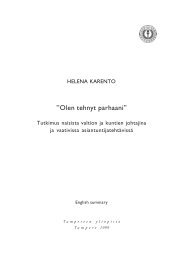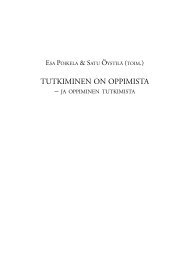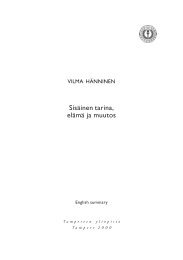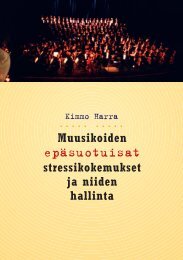Note on this edition: this is an electronic version of the 1999 book ...
Note on this edition: this is an electronic version of the 1999 book ...
Note on this edition: this is an electronic version of the 1999 book ...
You also want an ePaper? Increase the reach of your titles
YUMPU automatically turns print PDFs into web optimized ePapers that Google loves.
The (Un)Traditi<strong>on</strong>al<strong>is</strong>t: Clive Barker’s Devil 193writing from its traditi<strong>on</strong>al sources. As a study <strong>of</strong> evil <strong>th<strong>is</strong></strong> early work clearlyhas had <strong>an</strong> effect <strong>on</strong> how evil <strong>is</strong> depicted in Barker’s influential horror stories<strong>an</strong>d movies. He also makes use <strong>of</strong> <strong>the</strong> devil in a more general c<strong>on</strong>text, tocharacter<strong>is</strong>e <strong>the</strong> aims <strong>of</strong> h<strong>is</strong> work.I think <strong>on</strong>e <strong>of</strong> <strong>the</strong> things that’s been m<strong>is</strong>sing from m<strong>on</strong>ster movies <strong>of</strong> recentyears <strong>is</strong> that, for <strong>the</strong> most part, <strong>the</strong> m<strong>on</strong>sters <strong>the</strong>mselves have beendumb. [...]Evil <strong>is</strong> never abstract. It <strong>is</strong> always c<strong>on</strong>crete, always particular <strong>an</strong>d alwaysvested in individuals. To deny <strong>the</strong> creatures as individuals <strong>the</strong> right tospeak, to actually state <strong>the</strong>ir cause, <strong>is</strong> perverse – because I w<strong>an</strong>t to hear <strong>the</strong>Devil speak. I think that’s a Brit<strong>is</strong>h attitude. I like <strong>the</strong> idea that a point <strong>of</strong>view c<strong>an</strong> be made by <strong>the</strong> dark side. 4Clive Barker <strong>is</strong> not simply advocating here <strong>an</strong> interpretati<strong>on</strong> <strong>of</strong> <strong>the</strong>Devil as a real individual; <strong>the</strong> play partly c<strong>on</strong>tradicts <strong>an</strong>d complicates suchideas. In m<strong>an</strong>y points in <strong>the</strong> play it <strong>is</strong> emphas<strong>is</strong>ed that <strong>the</strong> Devil <strong>is</strong> not a hum<strong>an</strong>being <strong>an</strong>d to c<strong>on</strong>ceive <strong>of</strong> him as such would be a m<strong>is</strong>take. 5 The structure<strong>of</strong> <strong>the</strong> play <strong>is</strong> fragmentary, it c<strong>on</strong>s<strong>is</strong>ts <strong>of</strong> four acts that divide into overtwenty scenes. These take place over <strong>the</strong> sp<strong>an</strong> <strong>of</strong> three thous<strong>an</strong>d years <strong>an</strong>dcover various geographically unc<strong>on</strong>nected sites such as <strong>an</strong>cient Russia, aGreek settlement in North India, <strong>an</strong>d sixteenth century Lucerne. Barker’sDevil <strong>is</strong> interesting prec<strong>is</strong>ely because it <strong>is</strong> not a fixed individual with clearcutboundaries, but ra<strong>the</strong>r takes different gu<strong>is</strong>es <strong>an</strong>d <strong>is</strong> c<strong>on</strong>st<strong>an</strong>tly ch<strong>an</strong>ging. 6In <strong>th<strong>is</strong></strong> respect it <strong>is</strong> a liminal creature <strong>an</strong>d closely c<strong>on</strong>nected with <strong>the</strong> questi<strong>on</strong>sd<strong>is</strong>cussed in <strong>the</strong> first chapter.At <strong>the</strong> same time <strong>th<strong>is</strong></strong> specific incarnati<strong>on</strong> <strong>of</strong> <strong>the</strong> Devil (<strong>on</strong>e should rememberalso <strong>the</strong> title <strong>of</strong> <strong>the</strong> <strong>book</strong>, Incarnati<strong>on</strong>s) develops some pers<strong>on</strong>alityduring <strong>the</strong> play. Th<strong>is</strong> dem<strong>on</strong>ic character <strong>is</strong> unique in its positi<strong>on</strong> both as asubject with hum<strong>an</strong> attributes <strong>an</strong>d <strong>an</strong> individual h<strong>is</strong>tory, <strong>an</strong>d as a superhum<strong>an</strong>principle, or force. In <strong>th<strong>is</strong></strong> latter, impers<strong>on</strong>al role <strong>the</strong> Devil <strong>is</strong> shown tobe a mere narrative device, “a point <strong>of</strong> view” to borrow Barker’s own phrase.He <strong>is</strong> <strong>an</strong> actor c<strong>on</strong>st<strong>an</strong>tly taking up different roles <strong>on</strong> life’s stage, taking partin hum<strong>an</strong> suffering, but definitely not <strong>the</strong> origin <strong>of</strong> all evil acts, as in reli-4 Clive Barker, interview with Phil Edwards (“Hair-Ra<strong>is</strong>er,” Crims<strong>on</strong> Celluloid No.1/1988; Barker - J<strong>on</strong>es 1991, 11).5 These include: “THE DEVIL: I have no self to be certain <strong>of</strong>. Underst<strong>an</strong>d that, <strong>an</strong>d youunderst<strong>an</strong>d me.” “SAM KYLE: A wife c<strong>an</strong>not testify against her husb<strong>an</strong>d. That’s <strong>the</strong> law.POPPER: That’s true. CATHERINE LAMB: M’lord, <strong>th<strong>is</strong></strong> <strong>is</strong> no natural husb<strong>an</strong>d <strong>an</strong>d wife. [...]THE DEVIL: She’s too cruel. Too petty. SAM KYLE: (Quietly) Good. She’ll hum<strong>an</strong>ize you.Make you look a little more hum<strong>an</strong>.” (HD, 293, 350-51.)6 Barker’s Devil could easily have used as h<strong>is</strong> motto <strong>the</strong> same quotati<strong>on</strong> as Salm<strong>an</strong>Rushdie from <strong>the</strong> study by D<strong>an</strong>iel Defoe (<strong>an</strong>d not just h<strong>is</strong> title, The H<strong>is</strong>tory <strong>of</strong> <strong>the</strong> Devil):“Sat<strong>an</strong>, being thus c<strong>on</strong>fined to a vagab<strong>on</strong>d, w<strong>an</strong>dering, unsettled c<strong>on</strong>diti<strong>on</strong>, <strong>is</strong> without<strong>an</strong>y certain abode; for though he has, in c<strong>on</strong>sequence <strong>of</strong> h<strong>is</strong> <strong>an</strong>gelic nature, a kind <strong>of</strong> empirein <strong>the</strong> liquid waste <strong>of</strong> air, yet <strong>th<strong>is</strong></strong> <strong>is</strong> certainly part <strong>of</strong> h<strong>is</strong> pun<strong>is</strong>hment, that he <strong>is</strong> ...without <strong>an</strong>y fixed place, or space, allowed him to rest <strong>the</strong> sole <strong>of</strong> h<strong>is</strong> foot up<strong>on</strong>.” (Quotedas <strong>the</strong> epigraph <strong>of</strong> The Sat<strong>an</strong>ic Verses.)














